
Uniforms & Insignia | Ranks & Organization | Misc. | Contact
Epaulettes were worn on the most formal uniforms, use of which was suspended during the First World War:
The epaulettes of the military branch were all gold with silver devices, while other branches had gold devices and a silver edging around the strap and crescent. When engineer officers became part of the military branch in 1915, they began to wear the epaulettes of the military branch, and in October 1918 the military branch epaulettes became standard for all officers.
Flag officers had thicker and longer bullions, with a smaller diameter for captains and smaller again for commanders and below. Sub-lieutenants and their equivalents, mates and commissioned warrant officers, wore epaulettes without bullion fringe, known as shoulder straps or scales.
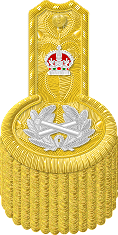
Admiral of the Fleet |
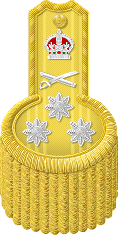
Admiral |
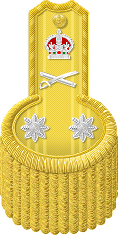
Vice-Admiral |
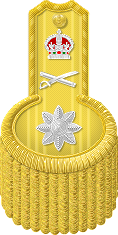
Rear-Admiral |
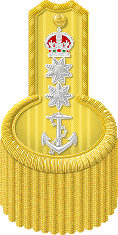
Commodore 1st or 2nd Class, Captain of 3 Years Seniority |
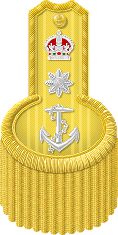
Captain under 3 Years Seniority |
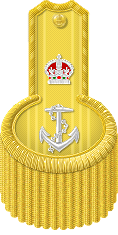
Commander |
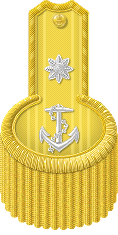
Lieutenant-Commander |
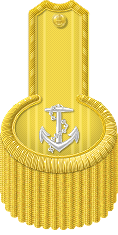
Lieutenant |
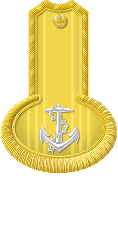
Sub-Lieutenant, Mate, Chief Gunner, Chief Boatswain, Commissioned Telegraphist |
| Engineer Branch |
| Medical Branch |
| Accountant Branch |
| Naval Instructor Branch |
| Artisan Branch |
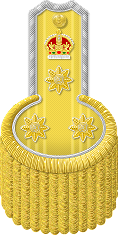
|
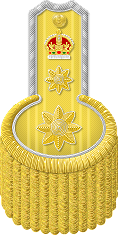
|
|
Engineer Vice-Admiral |
Engineer Rear-Admiral |
|
Medical Director-General |
Surgeon-General |
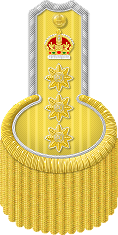 |
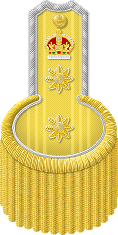 |
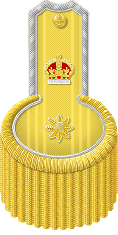 |
| Engineer Captain of 8 Years Service in Rank | Engineer Captain under 8 Years Service in Rank |
Engineer Commander |
| Deputy Surgeon General | Secretary to Commander-in-Chief of 5 Years Service in Rank |
Fleet Surgeon |
| Secretary to Admiral of the Fleet | Secretary to Commander-in-Chief under 5 Years Service in Rank | |
| Paymaster-in-Chief | Fleet Paymaster | |
|
Naval Instructor of 15 Years Seniority |
||
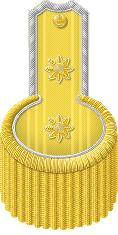 |
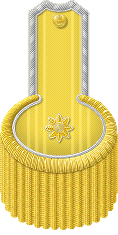 |
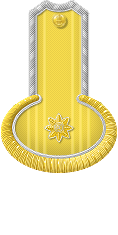 |
| Engineer Lieutenant-Commander | Engineer Lieutenant |
Mate (E), Chief Artificer Engineer, Commissioned Mechanician |
| Staff Surgeon | Surgeon | Assistant Paymaster Under 4 Years Seniority |
| Secretary to Flag Officer, Commodore 1st Class or Captain of the Fleet | Secretary to Commodore 2nd Class |
Chief Schoolmaster |
| Staff Paymaster, Paymaster | Assistant Paymaster of 4 Years Seniority | Chief Carpenter, Commissioned Electrician |
|
Naval Instructor of 8 Years Seniority |
Naval Instructor under 8 Years Seniority |
|
| Carpenter Lieutenant of 8 Years Seniority | Carpenter Lieutenant under 8 Years Seniority |
Officers of the R.N.R. and R.N.V.R. wore epaulettes similiar to those of the regular Royal Navy, but with a distinctive badge in place of the outermost device within the crescent.
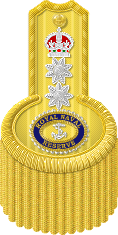
|
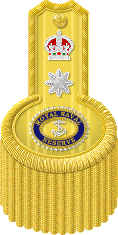
|
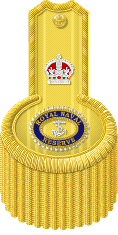
|
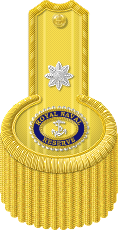
|
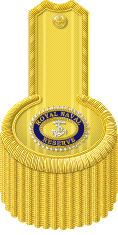
|
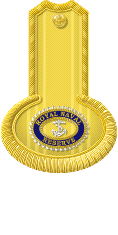
|
| Commodore 2nd Class, R.N.R., Captain of 3 years seniority, R.N.R. | Captain under 3 years seniority, R.N.R. | Commander, R.N.R. | Lieutenant-Commander, R.N.R. | Lieutenant, R.N.R. | Sub-Lieutenant, R.N.R. |
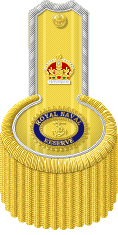
|
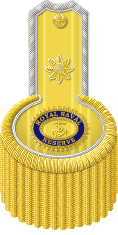
|
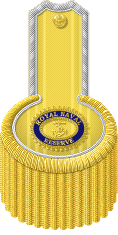
|
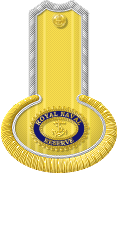
|
||
|
Chief Engineer, R.N.R. |
Staff Engineer, R.N.R. |
Engineer, R.N.R. |
Assistant Engineer, R.N.R. |
||
| Staff Paymaster, R.N.R., Paymaster, R.N.R. |
Assistant Paymaster of 4 years seniority, R.N.R. | Assistant Paymaster under 4 years seniority, R.N.R. | |||
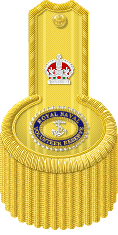
|
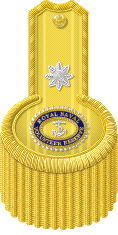
|
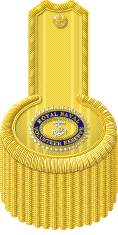
|
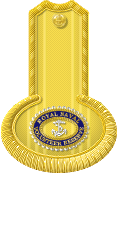
|
||
| Commander, R.N.V.R. | Lieutenant-Commander, R.N.V.R. | Lieutenant, R.N.V.R. | Sub-Lieutenant, R.N.V.R. | ||
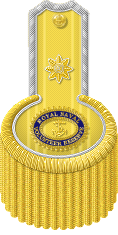
|
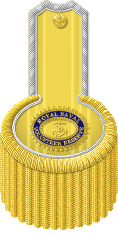
|
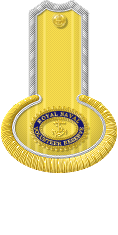
|
|||
|
Staff Surgeon, R.N.V.R. |
Surgeon, R.N.V.R. |
Surgeon Probationer, R.N.V.R. |
|||
| Staff Paymaster, R.N.V.R., Paymaster, R.N.V.R. |
Assistant Paymaster of 4 years seniority, R.N.V.R. | Assistant Paymaster under 4 years seniority, R.N.V.R. | |||
All text and images © Justin T. Broderick, 2013-2019 unless otherwise indicated.